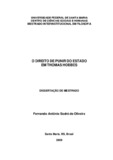| dc.creator | Oliveira, Fernando Antônio Sodré de | |
| dc.date.accessioned | 2009-10-13 | |
| dc.date.available | 2009-10-13 | |
| dc.date.issued | 2009-08-18 | |
| dc.identifier.citation | OLIVEIRA, Fernando Antônio Sodré de. O DIREITO DE PUNIR DO ESTADO EM THOMAS HOBBES. 2009. 127 f. Dissertação (Mestrado em Filosofia) - Universidade Federal de Santa Maria, Santa Maria, 2009. | por |
| dc.identifier.uri | http://repositorio.ufsm.br/handle/1/9067 | |
| dc.description.abstract | The present essay has the goal to investigate the right to punish and the punishment on the political thought of Thomas Hobbes, with the purpose to verify which is the essence of the right to punish, its legitimacy and its limits, as well as inquiring which function the punishment exerts in the State, if juridical, political, or both. For this reason, the first chapter begins with the investigation of the constituting elements of the thought of Hobbes, analyzing how the rationalism, the materialism,
the nominalism, the mechanicism and the Hobbesianian naturalism influence the definition of the referring concepts to the State and in the structure of its political
theory. Based on these concepts, it is verified how the disruption of Hobbesianian thought happens with the philosophical and the scholastic tradition, mainly with the
Aristotelian vision of human nature. After that, the factors that lead the institution of the Civil State, especially, the state of nature and the social pact are analyzed and its characteristic elements are distinguished. The second chapter has as a target to
clarify the concepts of the rights of nature, law of nature and civil law, verifying in which way these elements relate to the State and the sovereign power, as well as its importance. Therefore, it is verified the concept of Jusnaturalism and the legal positivism in Hobbes and how laws of nature consist on the rational basis for the institution of the Civil State. On the third chapter, the right to punish is examined in the Civil State, its origin, limits, purpose and if this element is part of the sovereignty. Moreover, it is examined the connection between law, crime and sin in Hobbes and
which is the influence of these concepts on the political obedience and the freedom of the subjects. Finally, it is verified how the punishment will consist in a political
controlling instrument on the sovereign power. | eng |
| dc.format | application/pdf | por |
| dc.language | por | por |
| dc.publisher | Universidade Federal de Santa Maria | por |
| dc.rights | Acesso Aberto | por |
| dc.subject | Punição | por |
| dc.subject | Poder soberano | por |
| dc.subject | Obediência política | por |
| dc.subject | Liberdade | por |
| dc.subject | Direito | por |
| dc.subject | Punishment | eng |
| dc.subject | Sovereign power | eng |
| dc.subject | Political obedience | eng |
| dc.subject | Freedom | eng |
| dc.subject | Right | eng |
| dc.title | O direito de punir do estado em Thomas Hobbes | por |
| dc.type | Dissertação | por |
| dc.description.resumo | A presente dissertação tem por objetivo investigar o direito de punir e a punição no pensamento político de Thomas Hobbes, com a finalidade de verificar qual a essência do direito de punir, sua legitimidade e limites, bem como averiguar
qual a função que a punição exerce no Estado, se jurídica, política, ou ambas. Para tanto, o primeiro capítulo inicia-se com a investigação dos elementos constituintes do
pensamento de Hobbes, analisando como o racionalismo, o materialismo, o nominalismo, o mecanicismo e o naturalismo hobbesiano influenciam na definição dos conceitos referentes ao Estado e na estruturação de sua teoria política. Partindo
desses conceitos, verifica-se como se dá o rompimento do pensamento hobbesiano com a tradição filosófica e a escolástica, principalmente com a visão aristotélica de
natureza humana. Em seguida, os fatores que conduzem a instituição do Estado Civil, especialmente o estado de natureza e o pacto social, são analisados e distinguidos seus elementos característicos. No segundo capítulo, busca-se
esclarecer os conceitos de direito de natureza, de lei de natureza e de lei civil, verificando como esses elementos relacionam-se com o Estado e o poder soberano,
bem como sua importância. Outrossim, verifica-se em que consiste o jusnaturalismo e o positivismo jurídico em Hobbes e como as leis de natureza constituem-se na base racional para a instituição do Estado Civil. No terceiro capítulo, examina-se o direito de punir no Estado Civil, sua origem, limites, finalidade e se este é elemento integrante da soberania. Além disso, examina-se a conexão entre lei, crime e pecado
em Hobbes e qual a influência desses conceitos na obediência política e na liberdade dos súditos. Por fim, verifica-se como a punição se constituirá em instrumento de controle político pelo poder soberano. | por |
| dc.contributor.advisor1 | Gallina, Albertinho Luiz | |
| dc.contributor.advisor1Lattes | http://lattes.cnpq.br/0750109262601371 | por |
| dc.contributor.referee1 | Pommer, Arnildo | |
| dc.contributor.referee1Lattes | http://lattes.cnpq.br/6826790692234990 | por |
| dc.contributor.referee2 | Krassuski, Jair Antônio | |
| dc.contributor.referee2Lattes | http://lattes.cnpq.br/5559214547314711 | por |
| dc.creator.Lattes | http://lattes.cnpq.br/6840430826217061 | por |
| dc.publisher.country | BR | por |
| dc.publisher.department | Filosofia | por |
| dc.publisher.initials | UFSM | por |
| dc.publisher.program | Programa de Pós-Graduação em Filosofia | por |
| dc.subject.cnpq | CNPQ::CIENCIAS HUMANAS::FILOSOFIA | por |


